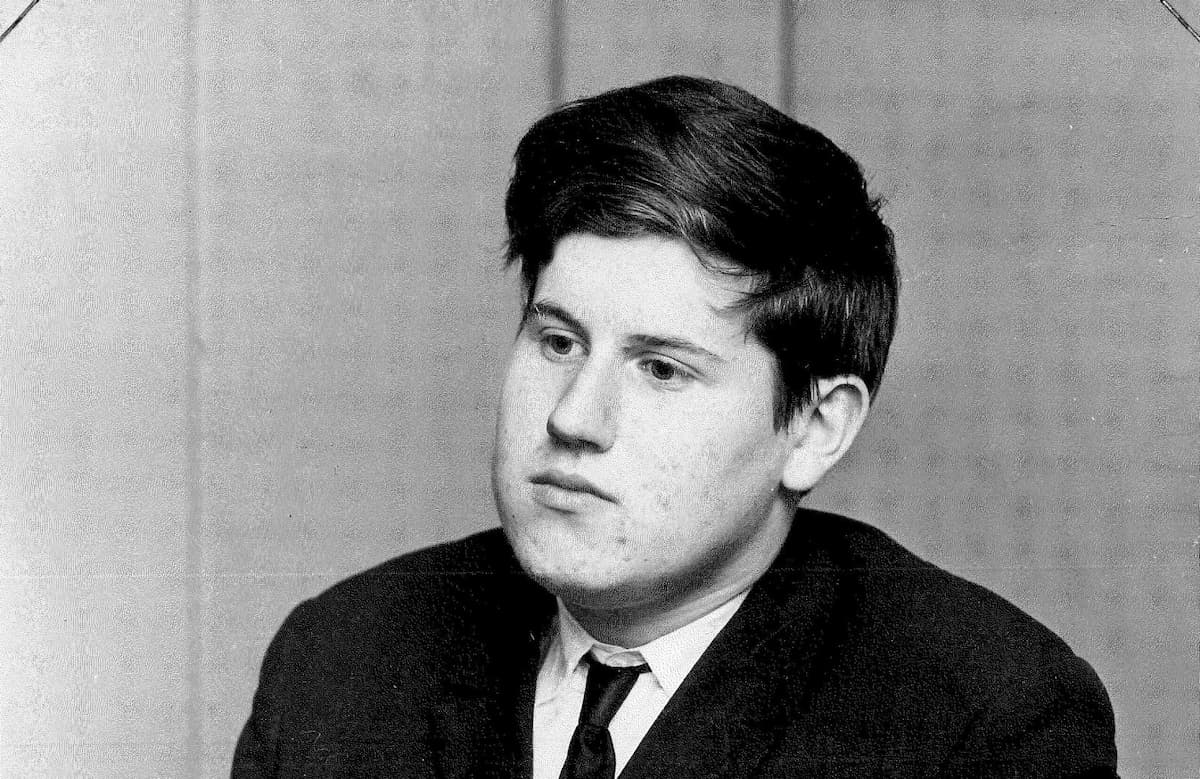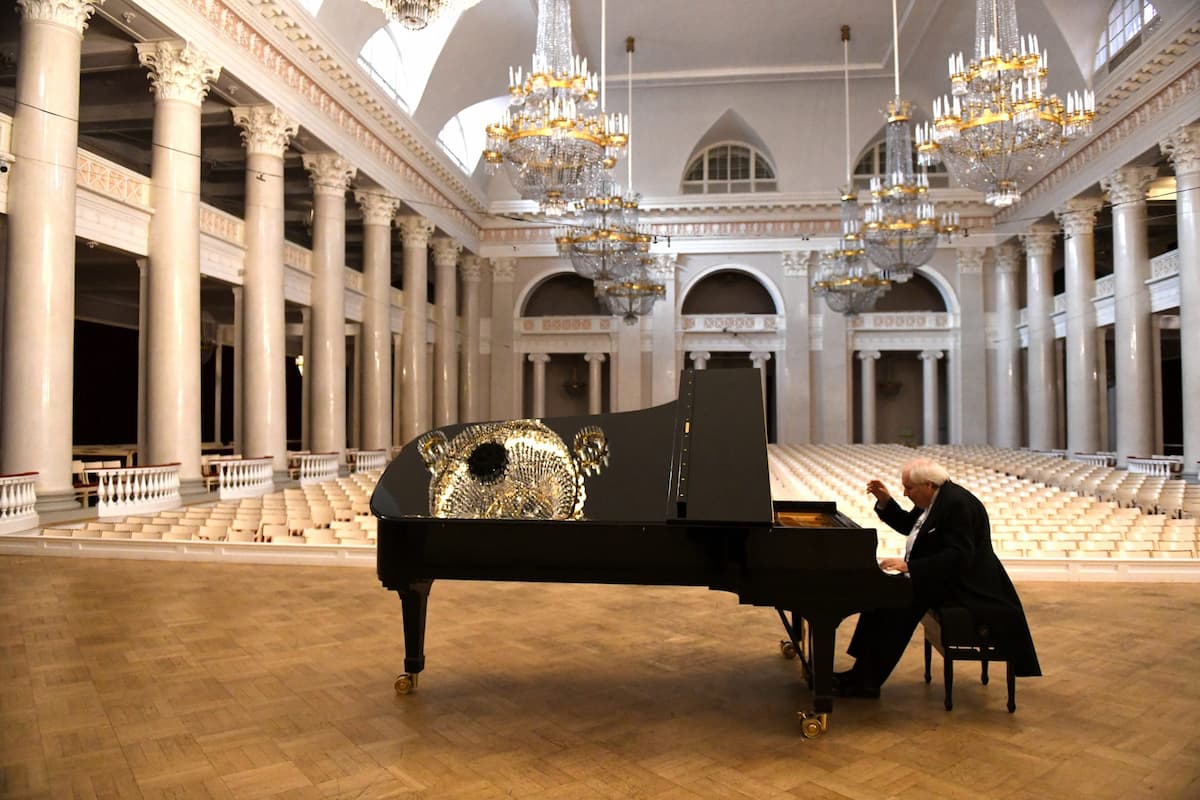A man in an oversized tuxedo emerges from backstage. He walks slowly but steadily, bows briefly with a stern, expressionless face, takes his seat and produces some of the most profound music on the piano in a dimly lit hall – this is Grigory Sokolov, one of the most revered pianists among both pianophiles and professional pianists alike.

Grigory Sokolov at 17 years of age (1967) © Wikipedia
Born in Leningrad (now St. Petersburg) in 1950, Sokolov initially aspired to be a conductor as a toddler of three, waving his miniature baton to “conduct” whatever was on the turntable, but this ambition was set aside shortly after his parents bought him a piano. Having started to learn the instrument at five, he soon showed great promise and was admitted to the Central Special Music School of the Leningrad Conservatory at the age of seven, studying with Leah Zelikhman and Moisey Khalfin. At the tender age of sixteen, he was permitted to the Tchaikovsky Competition on an exceptional basis, and, as many of you know, he won it. But the story was not that simple, as the audience and critics favoured American pianist Misha Dichter. Although time has proven the jury chaired by Emil Gilels right, this decision (by an overwhelming majority of jury members) prompted vehement reactions from the Moscow public at that time. Rumour has it that Gilels was even attacked by tomatoes and umbrellas after the results were announced.
Grigory Sokolov Plays Tchaikovsky’s Concerto No. 1
Unlike most pianists who rise to fame upon winning major competitions, Sokolov did not get to embark on a global career, courtesy of the Iron Curtain during which time he continued his studies at the Conservatory and taught at his alma mater. It wasn’t until the 1980s that the West became aware of this well-kept secret. Even then, he has never become a household name – he’s an intensely private (some might even say reclusive) person, having shunned the spotlight for decades, turned down numerous interview invitations and had essentially no interest in publicity, or in his own words, anything that disturbs music.
His aversion to recordings only adds to his enigma. To him, concerts represent sacred moments where real music-making happens (which brings to mind ichi-go ichi-e), rather than within a studio with artificial editing and splicing. He first signed with the French label Opus 111 and approved only a handful of albums. Yolanta Skura, Sokolov’s producer at the time, recalled his insistence on recording Chopin’s Preludes in a hall illuminated as if for a recital while donning formal attire. It wouldn’t be wrong to say that part of his more than deserved recognition came from bootleg recordings that continue to circulate among piano enthusiasts, which serve as a conduit for his artistry despite the sometimes less-than-ideal audio quality. In 2014, to the surprise and delight of many, he signed an exclusive contract with Deutsche Grammophon, since which he has released several phenomenal live albums.
Chopin: Prelude in B-flat minor, Op. 28 No. 16 (Grigory Sokolov, piano)
Alexander Scriabin: Poème Op.69 – No.2 Allegretto (Grigory Sokolov, piano)

Grigory Sokolov © worldmasterpianists.com
Each concert season sees a meticulously curated programme from Sokolov, half of which will be substituted with new works, and the cycle repeats such that he presents a completely new programme every time he visits a city. He only announces his programme just before the start of a season. The reason is simple – he only plays what he wants to play, even if this often creates headaches for concert organisers. While the Austro-German repertoire (e.g. Bach, Mozart, Beethoven) is central to his musical thinking, his repertoire spans from the English Renaissance composer William Byrd to Schoenberg and Boris Arapov. His penchant for early music also speaks for itself in his programming – I mean, who else would dare to perform an assortment of Byrd, Froberger, or Purcell’s music for half of the concert? Nevertheless, he almost always succeeds in proving these works can be played on the piano, with his understanding of Baroque rhetoric, his overwhelming musicianship and the unique possibilities offered by the instrument.
Grigory Sokolov Plays Rameau’s Les Cyclopes
Sokolov has also ceased performing with orchestras since 2005, for which he explained in an interview: “It’s not easy to find enough time to rehearse or to find an orchestra which is interested in the final product and not looking at their watch. It’s also not easy with conductors because you must find the combination of a very good musician who has this special talent to follow and to understand the music in the same way as you.” Even though I still consider it a great loss for the music community, this decision is not entirely incomprehensible, especially given his unwavering pursuit of perfection.
Grigory Sokolov Plays Rachmaninoff’s Piano Concerto No. 2 in C minor, Op.18
One shouldn’t be surprised to see a Steinway being dismantled or witness him using a torch to scrutinise the piano’s innards during rehearsals. Widely known for his uncompromising standards on the instrument, Sokolov demands extensive rehearsal time to thoroughly understand the piano. He once said, “I need to figure out for certain what the grand piano is capable of, what it wants, what it wouldn’t like to do, [and] what the tuner is to be told. I must comprehend it with all possible precision, and perhaps it likewise takes interest in understanding me.”
Behind the scenes. Grigory Sokolov in Salzburg & Eisenstadt, 2018
To hear Sokolov live, you will need to travel to Europe – his reticence to travel beyond Europe in recent decades is not borne of fear but rather a necessity to avoid the scourge of jet lag. (As a matter of fact, he has an immense passion for flight with impressive knowledge of aircraft and flight paths!) His admirers from other parts of the world have no choice but to find themselves searching for flights.
Listening to him in person is always something special. As he plays, he hunches over the keyboard and immerses himself in the music. Recordings, at best, can only approximate his distinct Sokolovian tone (by which one can immediately recognise him), not to mention the ritual-like atmosphere and the lasting impressions of his live performances. Anyone who has been to his concerts knows well that the evening consists of three parts, with the third offering up to six encores! Despite his demeanour on stage, he’s always courteous and affable offstage, listens attentively to his fans even after recitals lasting up to three hours, and sometimes even surprises with a playful wit.
When asked about his major musical influences, Sokolov named giants such as Emil Gilels, Dinu Lipatti, Sergei Rachmaninoff, Glenn Gould and Anton Rubinstein. While his playing is influenced by his predecessors and training (not only in his superhuman technique but also his ability to create a colossal yet rounded sound and keen attention to the singing quality of lines), to confine his pianism to a particular school of piano playing would be as facile as saying Glenn Gould belongs to the Canadian school.
It’s his relationship with the piano, inimitable imaginative prowess and erudition that enable him to articulate himself freely on the keyboard. One can only wonder how he delivers his ideas with such nuances and unbelievably rich sonorities with limitless gradations, whereby the tonal colour itself speaks emotions. Under Sokolov’s hands, every work is re-discovered with such conviction, even if one doesn’t necessarily agree with his interpretive choices – Bach’s music comes to life with not only immaculate characterisation of independent voices but also a construct of the Baroque, Chopin’s Mazurkas are given new weight and rendered as philosophical pondering, while Scriabin’s works take flight to the mystical realm.
Grigory Sokolov Plays Bach’s French Overture BWV 831
At the heart of Sokolov’s artistry lies an amalgam of ice and fire, an alchemy of intellect and emotion, at times speaking to metaphysical forces while remaining profoundly human. In a certain sense, he doesn’t actively invite the audience into the process of music-making, but his dialogue with the composer is so intense that it constantly draws listeners towards the emotional intricacies within the music, towards stories so uniquely yet compellingly told. With Sokolov, every note speaks, and every note has a meaning.
For more of the best in classical music, sign up for our E-Newsletter
Franz Schubert: Impromptu in A-flat major, Op. 142 No. 2 in A-Flat Major (Grigory Sokolov, piano)
